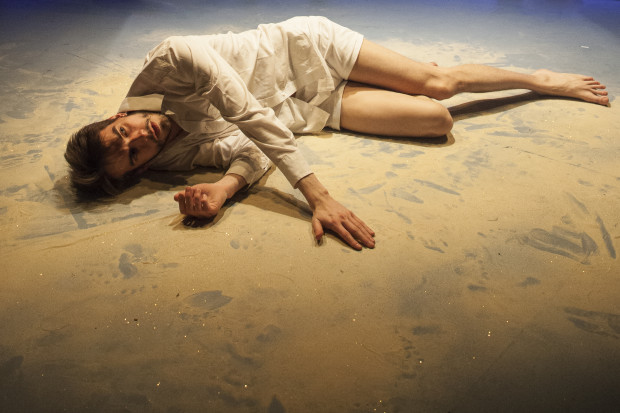You have no items in your cart. Want to get some nice things?
Go shopping
More than 25 years after his death, Beckett’s plays remain notoriously difficult to decipher, often defying and subverting theatrical conventions. Award-winning theatre company Whispering Beasts have chosen to take up the intimidating gauntlet thrown down by Beckett. They are currently performing three of his short plays in succession, Act Without Words I, Rough for Theatre II and Catastrophe, at the Old Red Lion theatre.
All three plays are, on the surface at least, drastically different in form and approach. But all are concerned with the existence of an autocratic external force that controls the protagonist, stripping them of any sense of hope or free agency.
First is Act Without Words I, a one-man mime piece (here performed as a dance) set in a desert of “dazzling light”. The protagonist, following whistles that direct his movements, veers to the left and to the right several times, but each time is buffeted backwards by some unseen, powerful entity. Three differently-sized cubes, a pair of scissors, some knotted rope and a small carafe of water come down from the ceiling above him at certain points, yet each time the unfortunate man stretches for these items they move out of his reach. There is seemingly no exit for him, no way out of this situation.
Interestingly enough, this is one of the few Beckett plays that has been almost universally panned by critics, with Ihab Hassan claiming that it seems “a little too obvious and pat” and Ruby Cohn arguing that it is “almost too explicit” in its intention. And it’s not just critics who have been left untouched by the mime. Beckett himself called it “primitive theatre”.
Yet these judgments are, in my view, unfair. Perhaps the mime is lacking in subtlety, but it is nonetheless powerful and affecting. In particular, on a few occasions, the small carafe of water dangles tantalisingly out of reach, despite the protagonist’s repeated best efforts to reach for it. This bitterly reiterates that he is striving so very much to get so little: an apt metaphor for the human condition. The carafe of water mocks the protagonist: it “dangles and plays about his face”. The protagonist amply displays his increasing frustration and desperation as he is thwarted at every turn. He eventually becomes so demotivated and crushed that “he does not move”.
Considering the small theatrical space of the Old Red Lion Theatre, it’s a testament to the ingenuity of the Whispering Beasts cast how well this mime (which Beckett envisaged as being performed on a much larger scale) succeeds. The three other members of the cast stand dressed in black, governing pulleys and levers to control the boxes, rope and carafe of water, with impeccable timing. Their backs are turned to the audience, highlighting that it’s an unseen force that is controlling the protagonist’s every movement.
On the surface, the following play – Rough for Theatre II – couldn’t be more different. Here, two men argue over the fate of a man ready to jump from a building and commit suicide. The two callously and disinterestedly debate whether the man’s life is worth saving.
Yet there are parallels here to Act without Words I. The two men seem to be in control of the man whose fate they are discussing (though it is never made clear quite how), in a similar way to how the man in Act Without Words I is controlled by an external force. Also, right at the end of Rough for Theatre II, the men hear tweeting and find two birds in a cage – one living, one dead. One of the men sorrowfully says: “All that is organic waste. All that splendour” and the other notes that the birds “have no seed, no water”. This affectingly echoes the fate of the man in the desert in Act without Words I, with a small carafe of water always out of his range and no sustenance of any kind to keep him going.
The archetype of the crushed, humiliated and desperate man continues into the third and final piece, Catastrophe. Catastrophe is dedicated to Vaclav Havel, the celebrated Czech playwright and dissident who was imprisoned for his political beliefs. A tyrannical director issues orders to his assistant, who makes adjustments to the star in the spotlight, a man dressed all in black with his head abjectly bowed. This main character is handled like an object, not like a human being – he is utterly dehumanised. The protagonist’s situation is clearly meant to mirror Havel’s own, as the assistant and director attempt to control and humiliate him.
The only questionably autonomous movement from the protagonist comes at the end, when he damningly raises his head and fixes the audience with a penetrating stare. “Questionably” because the end of this play is very open to interpretation. Is the raising of the head a defiant gesture? The protagonist does raise his head and forces the audience to see him finally as a human being rather than an object. But it is the assistant who, in fact, makes the first suggestion of raising the man’s head to the director. Therefore, even this movement isn’t a true act of free will but an unconscious adoption of the assistant’s directive, and only emphasises the protagonist’s absolute loss of autonomy.
The prominent literary critic Richard Ellman said of Beckett’s work: “He has given a voice to the decrepit and maimed and inarticulate, men and women at the end of their tether, past pose or pretense, past claim of meaningful existence…like salamanders we survive in his fire.” When you’ve survived Beckett’s scorching, dark vision, you are left reborn like a “salamander”. There is something strangely cathartic to these three plays. Because he is so extreme and there is such honesty to his work, you can be left feeling liberated by Beckett, although his vision is seemingly so bleak. Whispering Beasts, despite being formed relatively recently, grapple with the complexities and starkness of Beckett’s vision exceptionally well, showing that his crushed protagonists are unmistakably “at the end of their tether” and “past claim of meaningful existence” in the face of harsh external forces beyond their control.
Three Short Plays By Samuel Beckett continues at the Old Red Lion Theatre until April 25th. Tickets are £15 (£12.50 concessions).

About Ana Malinovic
Ana graduated from Warwick University with a BA in English and American Literature in 2010. Her dissertation was centred on dystopian elements in the fiction of Kafka. She enjoys uncovering innovative works of fiction by a diverse range of authors. She also spends much of her time roaming around London's arts and culture scene overexcitedly. Check out her blog




